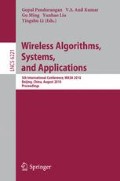Abstract
Previous designed synchronization approaches advocate an O(1) search complexity. Although it is efficient, such an approach is vulnerable to Desynchronization Attacks, in which the secret information will become incrementally different between the tag and reader. Either adversary can utilize this to distinguish tags or the legitimate tag and reader cannot authenticate with each other. Even worse, synchronization approaches suffer from replay attacks. To address these problems, we propose a DESynchronization Tolerant RFID private authentication protocol, DEST, which forces a tag to keep its behaviors undistinguishable. DEST provides desynchronization tolerance, replay attack resistance, and forward secrecy. The analysis results show that DEST effectively enhances the privacy protection for RFID private authentication, and provides the same efficiency, O(1), as traditional synchronization approaches.
Access this chapter
Tax calculation will be finalised at checkout
Purchases are for personal use only
Preview
Unable to display preview. Download preview PDF.
References
Bibliography on Security and Privacy in RFID Systems, http://www.avoine.net/rfid
Juels, A.: RFID Security and Privacy: a Research Survey. IEEE Journal on Selected Areas in Communication 24(2), 381–394 (2006)
Ohkubo, M., Suzuki, K., Kinoshita, S.: Cryptographic Approach to Privacy-friendly Tags. In: Proceedings of RFID Privacy Workshop. MIT, Cambridge (2003)
Ohkubo, M., Suzuki, K., Kinoshita, S.: Efficient Hash-Chain based RFID Privacy Protection Scheme. In: Proceedings of UbiComp, Workshop Privacy (2004)
Henrici, D., Mller, P.: Hash-based Enhancement of Location Privacy for Radio-Frequency Identification Devices Using Varying Identifiers. In: Proceedings of IEEE PerCom Workshops (2004)
Juels, A.: Minimalist Cryptography for Low-Cost RFID Tags. In: Blundo, C., Cimato, S. (eds.) SCN 2004. LNCS, vol. 3352, pp. 149–164. Springer, Heidelberg (2005)
Yao, Q., Qi, Y., Han, J., Zhao, J., Li, X., Liu, Y.: Randomizing RFID Private Authentication. In: Proceedings of IEEE PerCom (2009)
Author information
Authors and Affiliations
Editor information
Editors and Affiliations
Rights and permissions
Copyright information
© 2010 Springer-Verlag Berlin Heidelberg
About this paper
Cite this paper
Yao, Q., Qi, Y., Chen, Y., Zhong, X. (2010). A Desynchronization Tolerant RFID Private Authentication Protocol. In: Pandurangan, G., Anil Kumar, V.S., Ming, G., Liu, Y., Li, Y. (eds) Wireless Algorithms, Systems, and Applications. WASA 2010. Lecture Notes in Computer Science, vol 6221. Springer, Berlin, Heidelberg. https://doi.org/10.1007/978-3-642-14654-1_16
Download citation
DOI: https://doi.org/10.1007/978-3-642-14654-1_16
Publisher Name: Springer, Berlin, Heidelberg
Print ISBN: 978-3-642-14653-4
Online ISBN: 978-3-642-14654-1
eBook Packages: Computer ScienceComputer Science (R0)

